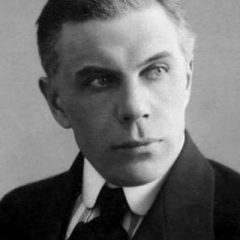Zhenshchina zavtrashnego dnya
Engl. title: Woman of Tomorrow
R: Pyotr Chardynin. B: Aleksandr Voznesensky. K: Boris Zavelev. D: Vera Yureneva, Ivan Mozzhukhin, M. Morskaya, Praskovya Maksimova, Aleksandr Vyrubov. P: Khanzhonkov. RUS 1914
Print: EYE
Dutch intertitles
By courtesy of Robert Fells who improved contrast, brightness, and the esthetic look of the copy in an excellent way.
“A doctor dedicated to her craft discovers her husband had cheated on her. Frankly, this was kind of lit and I really wish we could remaster it, some segments especially the couple walking down the streets of Moscow (? Leningrad? not sure) were particularly beautiful. In a shocking twist compared usually to the time, this feminist piece shows a more independent woman without sacrificing her emotions. Many films with this theme, of the wife being more financially and in life dominant than her husband, portray the wife as cold and unloving. Here, she adores her husband. She loves him, kisses him and hugs him constantly, fully understanding that her work takes her away from him and feeling sorry.”
Letterboxd (Margarita M)
“Vera Yureneva is a celebrated doctor who performs cures impossible to her male colleagues, tends to the famous and powerful, and is engaged to Ivan Mozzhukhin. (…) The credits indicate that in the original Russian version, as directed by Pyotr Chardynin, they are married. This makes a difference, because her busy schedule causes her to be away from her fiance, or perhaps husband, so he goes out in a huff and marries (or makes a mistress of) cafe waitress M. Morskaya. (…) Both sets of triangles are common enough, in reality and fiction, and depending on your beliefs, may or may not make a difference to you. However, it does in the movie, especially Miss Morskaya falls ill with something that only Miss Yureneva can deal with.
Pre-Communist Russian films have largely fallen into desuetude, but this is a fine and advanced film for 1914, with a tryptich shot the year after Lois Weber used one in Suspense. Had Chardynin seen Weber’s film? Hard to say. The thrust of this film is essentially normative, a well-produced bit of tear-jerking. Chardynin would continue to work after the Revolution — often abroad; eventually he would return to the now Soviet Union, where his career would end in 1928 with official disapproval, after directing more than 100 films. He died in 1934, age 61.”
IMDb (boblipton)
“The remarkable discovery here is the great Vera Yureneva (1876-1962) as the doctor who is also an activist for female rights – which was not just a role for Vera Yureneva. The film was written for her.
Nora (Yureneva) is a famous doctor, and her lover is Robert (Mozzhukhin). There are a lot of patients in Nora’s waiting room. There is an authentic quality in these scenes. (…) There is a (…) threeways split screen from a hotel from which Robert asks the concierge to call Nora. Nora is in the image on the left, the concierge and Robert are in the image to the right, and in the middle there is a city view – of Hanzhonkov studios. (…) There is an electrifying shot when Robert arrives and looks are exchanged. There is a further electrifying shot when Robert approaches and the shock starts to sink in. The performances have been rather subdued until now. The conclusion of the film is about Nora’s infinite disappointment, also involving gesticulation of sorrow and agony. It is a moving pantomimic conclusion to the story.
Chardynin’s early cinema storytelling style is assured. Much is in long shots or full shots, often in long takes.”
ANTTI ALANEN: FILM DIARY
>>> Pyotr Chardynin
>>> A Typical ‘Cinema Woodcut’
>>> Biography Chardynin: VUFKU (Lost & Found – Ukrainian Film Revolution of the 1920s)
